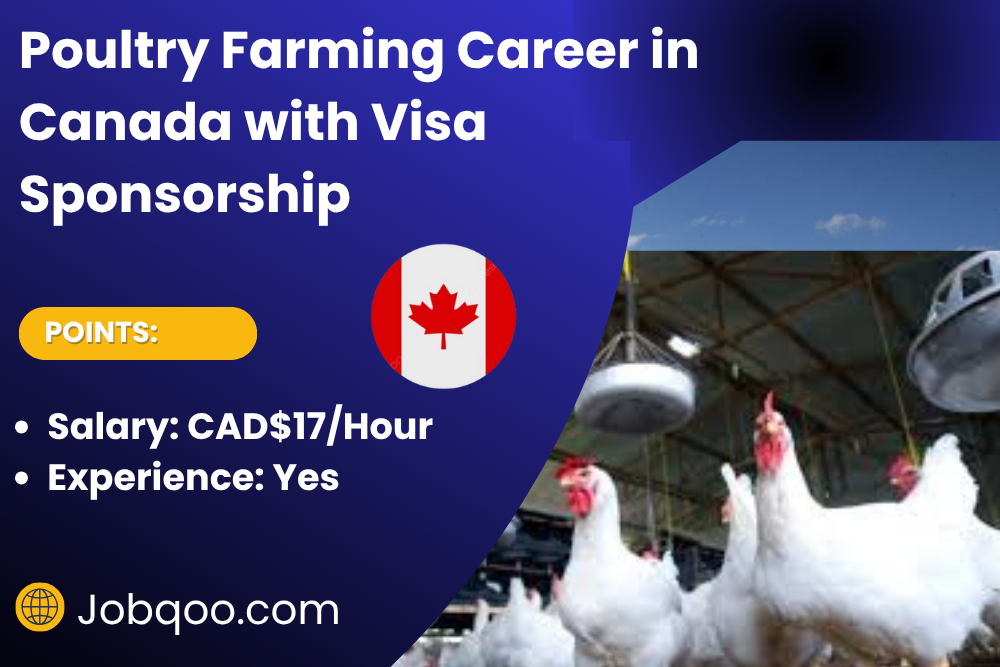Poultry Farming Career in Canada with Visa Sponsorship
Are you interested in building a sustainable career in agriculture and relocating to a country with excellent living standards? Poultry farming jobs in Canada with visa sponsorship provide a golden opportunity for international job seekers looking to start a meaningful career and settle in Canada.
Canada has a strong and growing agricultural sector, with poultry farming playing a significant role in the nation’s food production. With increasing demand and labour shortages, Canadian poultry farms are hiring international workers and offering visa sponsorship to qualified candidates.
This blog post explores everything you need to know about a poultry farming career in Canada in 2025—job roles, eligibility criteria, visa application process, salary, benefits, and how to apply.

Why Choose Canada for a Poultry Farming Career?
Canada is a land of opportunity, especially for those who are ready to work in critical sectors such as agriculture. Poultry farms across the country are facing labour shortages and are actively hiring foreign workers. Here’s why a poultry farming career in Canada is a great choice:
- Visa sponsorship is available through government-supported programs.
- High demand for agricultural workers, including poultry handlers, supervisors, and technicians.
- Opportunity to gain permanent residency after working in Canada.
- Stable and long-term job prospects in rural and semi-urban communities.
- Free healthcare, social security, and family support systems in place.
What is Poultry Farming?
Poultry farming involves raising domesticated birds such as chickens, turkeys, ducks, and geese for meat or eggs. Workers in poultry farms perform various tasks including feeding birds, cleaning barns, collecting eggs, maintaining equipment, and monitoring animal health.
Key Poultry Farm Roles:
- Poultry Farm Worker
- Hatchery Worker
- Poultry Barn Cleaner
- Poultry Vaccinator
- Egg Collector
- Broiler Farm Attendant
- Farm Supervisor or Foreman
Types of Poultry Farming Jobs in Canada
Depending on your skills and experience, there are several job roles available in the poultry industry:
1. Poultry Farm Worker
- Feeding and watering birds
- Cleaning poultry houses and equipment
- Egg collection and packaging
- Basic bird health checks
2. Hatchery Technician
- Monitoring incubators
- Handling baby chicks
- Data recording and grading
3. Farm Supervisor
- Managing farm operations
- Overseeing junior staff
- Ensuring compliance with regulations
4. Livestock Technician
- Administering vaccines
- Maintaining health and productivity records
- Diagnosing minor diseases
Eligibility Criteria for Poultry Farm Jobs in Canada
To work in a poultry farm in Canada as a foreigner with visa sponsorship, you must meet these general requirements:
| Criteria | Description |
|---|---|
| Age | Must be 18 years or older |
| Education | No formal degree required, but basic education preferred |
| Language | Basic English or French communication (CLB 4 minimum) |
| Experience | 0–2 years for entry-level roles; 2–5 years for supervisors |
| Physical Fitness | Must be physically able to lift, stand, and perform farm tasks |
| Work Permit | Required unless entering via PR pathways |
Additional Qualifications:
- Experience in poultry or livestock handling
- Knowledge of biosecurity protocols
- Willingness to work in rural settings
- Ready to work shifts, weekends, or early mornings
Visa Sponsorship and Work Permits
Most foreign workers are hired through Canada’s Temporary Foreign Worker Program (TFWP), which allows employers to sponsor foreign nationals.
Common Work Permit Categories:
- Agricultural Stream (TFWP)
- LMIA required (Labour Market Impact Assessment)
- Seasonal and full-time poultry jobs
- Agri-Food Pilot Program
- Includes poultry production under NOC codes
- Offers a direct pathway to permanent residence
- Provincial Nominee Programs (PNPs)
- Provinces like Saskatchewan, Alberta, and Manitoba recruit poultry workers
- Rural and Northern Immigration Pilot (RNIP)
- Jobs in rural areas with community support and PR pathways
Required Documents
To apply for a poultry farm job in Canada, prepare the following:
- Valid passport
- Updated resume (CV)
- Educational certificates (if available)
- Proof of work experience
- Language test results (IELTS/TEF)
- Job offer letter from Canadian employer
- Labour Market Impact Assessment (LMIA)
- Medical exam results
- Police clearance certificate
- Photographs and biometric details
Application Process for Poultry Farm Jobs with Sponsorship
Follow these steps:
Step 1: Search for a Sponsored Job
Look for poultry farm jobs in Canada that offer visa sponsorship and are LMIA-approved.
Step 2: Submit Resume and Cover Letter
Tailor your application to the job role with a clear resume and job-specific cover letter.
Step 3: Employer Applies for LMIA
Your employer in Canada will submit an LMIA application to Employment and Social Development Canada (ESDC).
Step 4: Apply for a Work Permit
Once the LMIA is approved, use the job offer and LMIA to apply for your Canadian work permit.
Step 5: Travel and Start Working
After approval, you’ll receive a visa and can travel to Canada to begin your job.
Salary Range for Poultry Farm Workers in Canada
Salaries vary based on experience, region, and job role. On average:
| Position | Hourly Wage | Monthly Salary |
|---|---|---|
| Poultry Farm Worker | $15 – $19 | $2,400 – $3,000 CAD |
| Hatchery Worker | $16 – $20 | $2,500 – $3,200 CAD |
| Farm Supervisor | $20 – $25 | $3,200 – $4,200 CAD |
| Livestock Technician | $20 – $26 | $3,200 – $4,400 CAD |
Overtime, accommodations, and bonuses may be included in some job contracts.
Benefits of Working in Poultry Farming in Canada
- Visa Sponsorship and LMIA Support
- Permanent Residency Pathway via Agri-Food Pilot or PNPs
- Free Housing or Subsidized Accommodation
- Health and Dental Insurance
- Opportunities for Family Sponsorship
- Training and Career Progression
- Work-Life Balance in Rural Canada
Top Provinces for Poultry Farming Jobs in Canada
Canada’s poultry farming is mostly located in rural and semi-urban provinces.
| Province | Key Features |
|---|---|
| Ontario | Largest poultry production, high demand |
| Alberta | Growing poultry industry, good wages |
| British Columbia | Sustainable farms, many LMIA jobs |
| Saskatchewan | Rural employment with PR pathways |
| Manitoba | Strong agricultural support for foreign workers |
How to Find Poultry Farm Jobs with Visa Sponsorship
Top Job Boards:
Recruitment Agencies:
- GreenTech Resources (Saskatchewan)
- Global Hire Immigration & Placement Services
- Canadian Job Bank (LMIA jobs)
Direct Application:
Apply directly to farm companies with open roles or attend virtual job fairs.
Top Canadian Employers Hiring Poultry Workers
| Company | Location | Sponsorship |
|---|---|---|
| Maple Leaf Foods | Manitoba, Alberta | Yes |
| Sofina Foods | Ontario, Alberta | Yes |
| Cargill Canada | Alberta | Yes |
| Burnbrae Farms | Ontario | Yes |
| Lilydale Poultry | Alberta | Yes |
These companies have historically hired foreign workers under LMIA and are known for long-term contracts.
FAQs on Poultry Farming Careers in Canada
1. Do I need experience to apply?
Basic experience is preferred, but some employers train entry-level workers.
2. What is the processing time for work permits?
It typically takes 8 to 16 weeks, depending on country of application and completeness of documents.
3. Can I bring my spouse and children?
Yes, through the TFW program, dependents can apply for open work or study permits.
4. Is permanent residency possible?
Yes, after 1–2 years, you can apply through Agri-Food Pilot, PNP, or RNIP.
5. Are jobs seasonal or full-time?
Most poultry farming jobs are full-time and year-round, unlike other seasonal farm roles.
Final Thoughts
A poultry farming career in Canada with visa sponsorship offers financial security, growth, and the chance to build a new life in one of the world’s most immigrant-friendly countries. Whether you’re an experienced farm worker or just starting out, this sector provides ample opportunities in 2025.
With the right job search strategy, proper documentation, and dedication, your Canadian dream in agriculture can become a reality.

